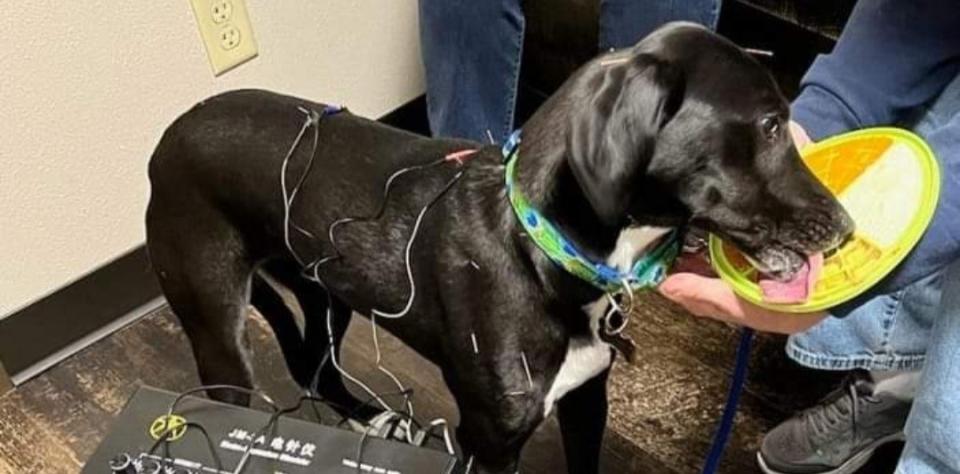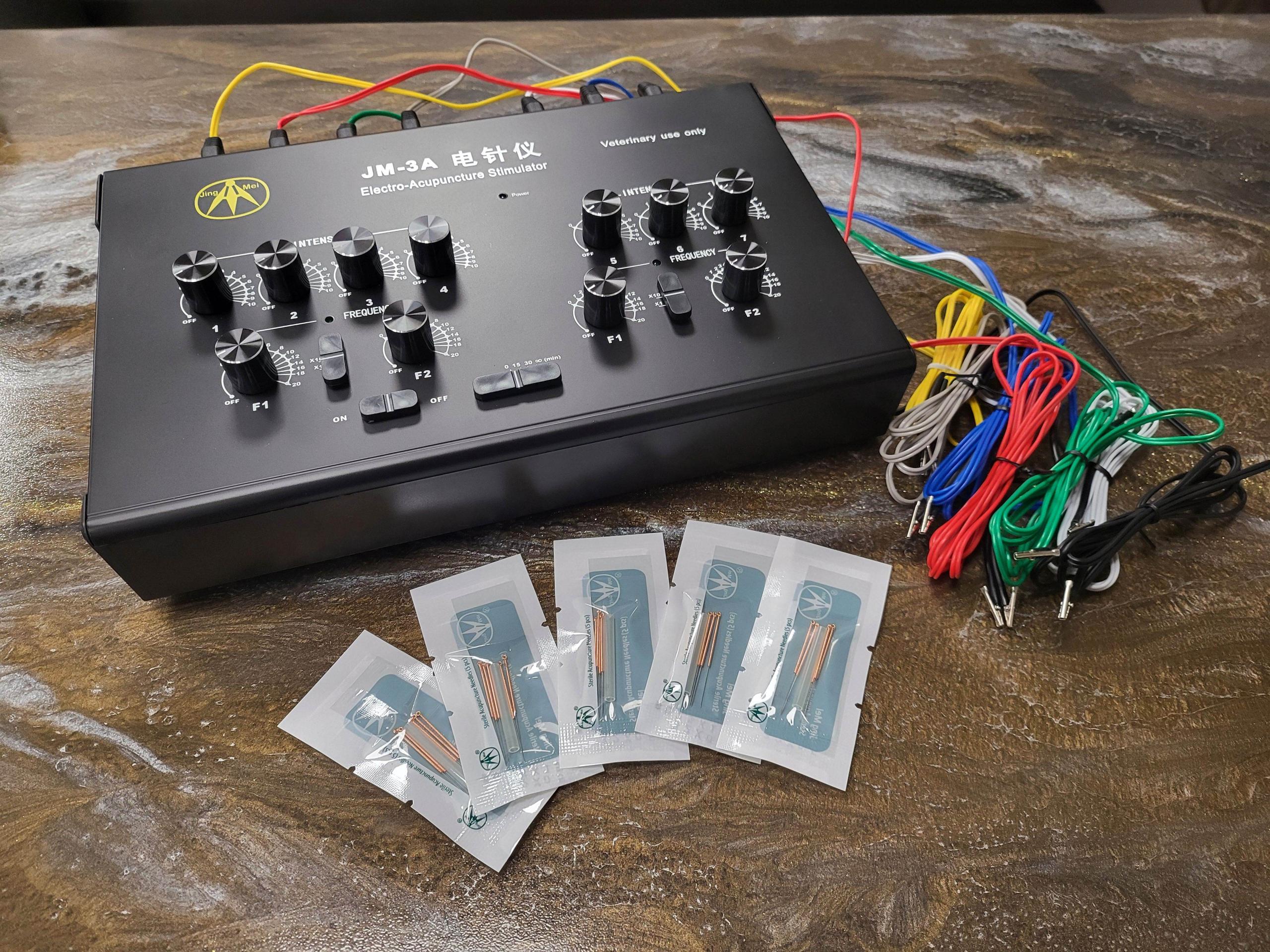
At The Hometown Veterinarian, we offer veterinary acupuncture as part of our integrative approach to health and wellness. Acupuncture involves inserting thin, sterile needles into specific points on the body to promote healing, reduce pain, and enhance recovery. This ancient practice, now adapted for pets, works especially well when combined with modern western medicine to treat various conditions.
What is Acupuncture:
Acupuncture involves the insertion of thin sterile needles into discrete and specific points on the body in order to cause a therapeutic effect. Acupuncture sometimes includes other methods like electrical stimulation (electro-acupuncture). The ancient Chinese developed acupuncture and discovered hundreds of acupuncture points used to treat aliments and diseases, which have now been transposed to animals and area useful in treating many common issues that our pets develop.
*Acupuncture is a great tool to use in conjunction with western medicine for an integrative approach to whole body health. *
Acupuncture can be used on animals?
Absolutely! Veterinarians have long used acupuncture to treat animals in the same ways that acupuncture is used to help people.
Acupuncture Services We Offer
- Acupuncture for Dogs
- Acupuncture for Cats
- Acupuncture for Exotic Pets
We also offer electro-acupuncture, which involves using electrical stimulation to enhance the effects of traditional acupuncture.
What can acupuncture treat?
Acupuncture can technically treat any disease/ailment that an animal has and 2000 years ago when acupuncture was the only way to treat diseases, it was used for everything. Thanks to modern western medicine, we now have more tools at our disposal. Acupuncture is still a great tool to use in conjunction with western medicine to treat a variety of cases.
Veterinary acupuncture is used to treat a variety of conditions, including:
- Pain and Lameness
- Aging and Mobility Issues
- Neurological Conditions (Seizures, IVDD)
- Post-Surgical Recovery
- Back Injuries and Paralysis
How does acupuncture work?
Acupuncture points (acupoints) are located in the areas where there is a high density of free nerve endings, mast cells, small arterioles, and lymphatic vessels. Most acupoints are motor points. Many studies indicate that the stimulation of acupoints induces the release of beta-endorphins, serotonin, and other neurotransmitters. The US National Institutes of Health’s National Library of Medicine (www.pubmed.gov) has a total of 25,764 research papers regarding acupuncture and 404 animal specific articles as of Feb. 2017. Studies show that acupuncture induces physiological effects including pain relief, promotion of tissue healing, regulation of GI motility, immunoregulation, hormone/reproductive regulation, and antifebrile effects.
Why Choose Veterinary Acupuncture?
- Non-Invasive & Safe: No need for sedation or surgery.
- Effective Pain Relief: Promotes natural healing and reduces the need for medications.
- Integrative Approach: Combines well with modern veterinary medicine for a holistic care plan.
- Post-Surgical Recovery: Helps smooth recovery and reduce inflammation after surgery.
How long does each treatment take?
Each session may take 15-30 minutes depending on the patient and the treatment.
How soon can we expect results after treatment?
Some results can be seen immediately but others will require several treatments. Generally a minimum of 3-5 treatments 1-2 weeks apart for chronic conditions are needed before an owner can expect notable improvement. Each patient is different and each treatment will reflect the patient’s diagnosis and chronicity. If/when we do see progress in the medical condition, it is often likely that we can reduce the amount of medication that the patient is on (depending on the condition).
How many treatments are needed?
As in all medicine, this depends on the situation and how often treatments can be done. Often we will start treatment once per week for 3 weeks and then assess how the patient is doing and how the case is progressing.
What is electro-acupuncture?

Acupuncture is typically done using needles – often called “dry needling." When we hook these needles up to an acupuncture electrical unit it is called “electro-acupuncture”. Depending on the case and the patient, Dr. Franken often uses electro-acupuncture to help make treatments stronger and last longer.
Does acupuncture hurt?
Rarely! Acupuncture is not painful because acupuncture points are stimulated using very fine needles, almost as thin as a hair. Over 95% of patients are comfortable with acupuncture therapy. Due to the relaxation effect, some animals will fall asleep during acupuncture treatments.
Can veterinary acupuncture be combined with other treatments?
Absolutely! Acupuncture is regularly combined with modern western medicine. Every patient is an individial and we create a plan to combine treatments to reach the best outcomes. Acupuncture is especially useful to encourage recovery from illnesses and even surgery. Recovery is often smoother and shorter for animals receiving acupuncture following surgery for many orthopedic problems such as cranial cruciate ligament injury.
When should acupuncture not be used?
Caution should be used when a patient has a fracture, is pregnant, or has open wounds or tumors. Acupuncture also cannot be used when patients are unable to be safely handled. Animals should not be sedated for acupuncture because the procedure relies on nerve centers to "be awake."
Meet our acupuncture veterinarian:
Dr. Rachael Franken received her DVM from Iowa State University in 2020 and her Certificate of Veterinary Acupuncture (CVA) in 2021. She practices both traditional acupuncture and modern western medicine for a unique approach to her cases. She loves being able to approach cases from different angles and work with clients and pets to tailor to their exact needs.
To learn more and set up an evaluation, call our office in Marshalltown, Iowa at 641-758-3333 or click to Request an Appointment
